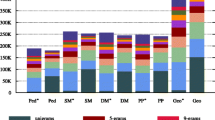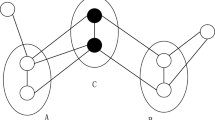Abstract
A contrastive approach to term extraction is an extensive class of methods based on the assumption that the words frequently occurring within a domain and rarely beyond it are most likely terms. The disadvantage of this approach is a great number of type II errors – false negatives. The cause of these errors is in the idea of contrastive selection when the most representative high frequent terms are extracted from the texts and rare terms are discarded. In this work, we propose a new operationalization of the contrastive approach, which supports the capture of both high frequent and low frequent domain terms. Proposed operationalization reduces the number of false negatives. The experiments performed on the texts of the subject domain “Geology” show promising of proposed approach.
Access this chapter
Tax calculation will be finalised at checkout
Purchases are for personal use only
Similar content being viewed by others
References
Medelyan, O., Manion, S., Broekstra, J., Divoli, A., Huang, A.-L., Witten, I.H.: Constructing a focused taxonomy from a document collection. In: Cimiano, P., Corcho, O., Presutti, V., Hollink, L., Rudolph, S. (eds.) ESWC 2013. LNCS, vol. 7882, pp. 367–381. Springer, Heidelberg (2013)
Medelyan, O. et al.: Automatic construction of lexicons, taxonomies, ontologies, and other knowledge structures. In: Wiley Interdisciplinary Reviews: Data Mining and Knowledge Discover, vol. 3, no. 4, pp. 257–279 (2013)
Fan, J., et al.: Automatic knowledge extraction from documents. IBM J. Res. Dev. 56(3.4), 5:1–5:10 (2012)
Aggarwal, C.C., Zhai, C.X.: Mining Text Data. Springer Science & Business Media, New York (2012)
Nenadi, G., Ananiadou, S., McNaught, J.: Enhancing automatic term recognition through recognition of variation. In: Proceedings of the 20th International Conference on Computational Linguistics, p. 604. Association for Computational Linguistics (2004)
Ahrenberg, L.: Term extraction: A Review Draft Version 091221 (2009)
Kageura, K., Umino, B.: Methods of automatic term recognition: a review. Terminology 3(2), 259–289 (1996)
Wong, W., Liu, W., Bennamoun, M.: Determination of unithood and termhood for term recognition. In: Handbook of Research on Text and Web Mining Technologies. IGI Global (2008)
Polya, G.: Mathematical Discovery: On Understanding, Learning, and Teaching Problem Solving. Wiley, New York (1981)
Heylen, K., De Hertog, D.: Automatic term extraction. In: Handbook of Terminology, vol. 1 (2014)
Weeber, M., Baayen, R.H., Vos, R.: Extracting the lowest-frequency words: pitfalls and possibilities. Comput. Linguist. 26(3), 301–317 (2000)
Yang, Y., Pedersen, J.O.: A comparative study on feature selection in text categorization. In: ICML, vol. 97, pp. 412–420 (1997)
Kim, S.N., Cavedon, L.: Classifying domain-specific terms using a dictionary. In: Australasian Language Technology Association Workshop 2011, p. 57 (2011)
da Silva Conrado, M., Pardo, T.A.S., Rezende, S.O.: A machine learning approach to automatic term extraction using a rich feature set. In: HLT-NAACL, pp. 16–23 (2013)
Ahmad, K., et al.: University of surrey participation in TREC8: weirdness Indexing for logical document extrapolation and retrieval (WILDER). In: TREC (1999)
Gillam, L., Tariq, M., Ahmad, K.: Terminology and the construction of ontology. Terminology 11(1), 55–81 (2005)
Peñas, A., et al.: Corpus-based terminology extraction applied to information access. In: Proceedings of Corpus Linguistics, pp. 458–465 (2001)
Kim, S.N., Baldwin, T., Kan, M-Y.: An unsupervised approach to domain-specific term extraction. In: Australasian Language Technology Association Workshop 2009, pp. 94–98 (2009)
Basili, R.: A contrastive approach to term extraction. In: Proceedings of the 4th Terminological and Artificial Intelligence Conference (TIA 2001) (2001)
Wong, W., Liu, W., Bennamoun, M.: Determining termhood for learning domain ontologies using domain prevalence and tendency. In: Proceedings of the Sixth Australasian Conference on Data Mining and Analytics, vol. 70, pp. 47–54. Australian Computer Society, Inc. (2007)
Sclano, F., Velardi, P.: Termextractor: a web application to learn the shared terminology of emergent web communities. In: Gonçalves, R.J., Müller, J.P., Mertins, K., Zelm, M. (eds.) Enterprise Interoperability II, pp. 287–290. Springer, London (2007)
Astrakhantsev, N.A., Fedorenko, D.G., Turdakov, D.Y.: Methods for automatic term recognition in domain-specific text collections: a survey. Program. Comput. Softw. 41(6), 336–349 (2015)
Kit, C., Liu, X.: Measuring mono-word termhood by rank difference via corpus comparison. Terminology 14(2), 204–229 (2008)
Lopes, L., Fernandes, P., Vieira, R.: Estimating term domain relevance through term frequency, disjoint corpora frequency-tf-dcf. Knowl.-Based Syst. (2016)
Wong, W., Liu, W., Bennamoun, M.: Determining termhood for learning domain ontologies in a probabilistic framework. In: Proceedings of the Sixth Australasian Conference on Data Mining and Analytics, vol. 70, pp. 55–63. Australian Computer Society, Inc. (2007)
Prelov, V.: Mutual information of several random variables and its estimation via variation. Prob Inf Transm. 45(4), 295–308 (2009)
Manning, C.D., et al.: Introduction to Information Retrieval, vol. 1, p. 496. Cambridge University Press, Cambridge (2008)
Hasan, K.S., Ng, V.: Automatic keyphrase extraction: a survey of the state of the art. In: ACL, vol. 1, pp. 1262–1273 (2014)
Matsuo, Y., Ishizuka, M.: Keyword extraction from a single document using word co-occurrence statistical information. Int. J. Artif. Intell. Tools 13(01), 157–169 (2004)
Sokolovsky, A.K. (ed.): A Textbook of General geology: In 2 volumes, vol. 1, p. 448. KDU, George Town (2006)
Author information
Authors and Affiliations
Corresponding author
Editor information
Editors and Affiliations
Rights and permissions
Copyright information
© 2016 Springer International Publishing Switzerland
About this paper
Cite this paper
Nugumanova, A., Bessmertny, I., Baiburin, Y., Mansurova, M. (2016). A New Operationalization of Contrastive Term Extraction Approach Based on Recognition of Both Representative and Specific Terms. In: Ngonga Ngomo, AC., Křemen, P. (eds) Knowledge Engineering and Semantic Web. KESW 2016. Communications in Computer and Information Science, vol 649. Springer, Cham. https://doi.org/10.1007/978-3-319-45880-9_9
Download citation
DOI: https://doi.org/10.1007/978-3-319-45880-9_9
Published:
Publisher Name: Springer, Cham
Print ISBN: 978-3-319-45879-3
Online ISBN: 978-3-319-45880-9
eBook Packages: Computer ScienceComputer Science (R0)




